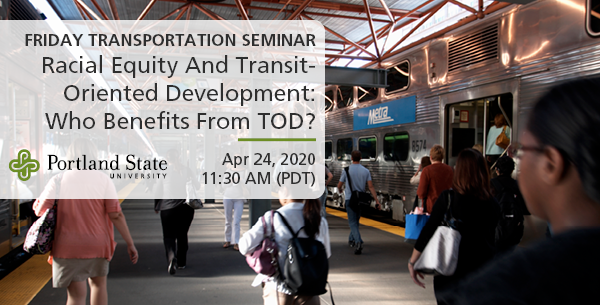
We regret to inform you that our guest speaker will no longer be able to join us. This seminar has been cancelled. We remain committed to making decisions that promote the success and well-being of our communities, and support our community members in following taking steps to take care of themselves, minimize the spread of the COVID-19, and protect those who are the highest risk. We apologize for any inconvenience this may cause, and look forward to seeing you at future events.
THE TOPIC
This session explores the work of the Elevated Chicago collaborative within the context of the 2019 equitable TOD (eTOD) ordinance passed by the City of Chicago, which requires the creation of an equitable policy plan to proactively address displacement and depopulation through TOD. Elevated Chicago is a coalition of community organizers, City government, developers, environmentalists, artists and financial institutions advancing eTOD, through capital projects, infrastructure, systems and culture change, and programs in support of TOD projects. We will explore how Elevated Chicago addresses two types of displacement of people of color (gentrification-led and disinvestment-led) by supporting affordable housing, business incubators and community centers near transit, and posing the questions: What is racial equity? How will future TOD retain, attract and create wealth for people of color? How can community stakeholders lead the private, public and civic sectors?
KEY LEARNING TAKEAWAYS
- How to start and sustain diverse, equitable and inclusive collaboratives to promote TOD supported by the communities where it takes place
- How to support both realistic and aspirational visions from community residents in TOD planning and implementation, by growing public and private sector capacity in Diversity, Equity & Inclusion (DEI) and community engagement
- How to integrate public health, racial equity, climate resiliency and arts & culture considerations in transit-oriented infrastructure and bricks-and-mortar projects
SPEAKERS
Roberto Requejo, Elevated Chicago
Roberto Requejo is an urban planner specialized in transit-oriented community development with a focus on affordable housing, and a diversity, equity and inclusion (DEI) leader and practitioner. Since April 2017, he has led Elevated Chicago as its program director, developing the collaborative’s foundational work culture, values and governance; coordinating its strategies and workplan; mobilizing $2M+ in resources; and developing processes to ensure racial equity and inclusion in grantmaking, capital investment, systems change, knowledge sharing, and community engagement. Prior to joining Elevated Chicago Roberto worked for the Federal Reserve of Chicago, The Chicago Community Trust, Citibank, and Metropolitan Planning Council, leading collaborative teams, making grants and investments, and advancing policy and advocacy for equitable development. He holds masters and degrees in Urban Planning & Policy (University of Illinois at Chicago) and Advanced Political Studies (Universidade de Santiago de Compostela). He immigrated from Spain to the US in 2001 and lives in Edgewater, one of Chicago's most ethnically diverse and transit-rich communities.
PROFESSIONAL DEVELOPMENT
This 60-minute seminar is eligible for 1 hour of professional development credit for AICP (see our provider summary). We can provide an electronic attendance certificate for other types of certification maintenance.
LEARN MORE
Sign up for our newsletter to receive monthly updates.
Photo by chiarito/iStockphoto.com
The Transportation Research and Education Center (TREC) at Portland State University is home to the National Institute for Transportation and Communities (NITC), the Initiative for Bicycle and Pedestrian Innovation (IBPI), and other transportation programs. TREC produces research and tools for transportation decision makers, develops K-12 curriculum to expand the diversity and capacity of the workforce, and engages students and professionals through education.
